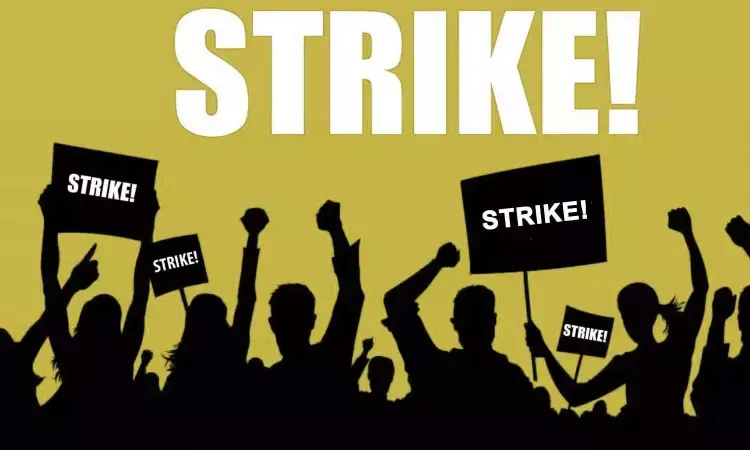- Home
- Medical news & Guidelines
- Anesthesiology
- Cardiology and CTVS
- Critical Care
- Dentistry
- Dermatology
- Diabetes and Endocrinology
- ENT
- Gastroenterology
- Medicine
- Nephrology
- Neurology
- Obstretics-Gynaecology
- Oncology
- Ophthalmology
- Orthopaedics
- Pediatrics-Neonatology
- Psychiatry
- Pulmonology
- Radiology
- Surgery
- Urology
- Laboratory Medicine
- Diet
- Nursing
- Paramedical
- Physiotherapy
- Health news
- Fact Check
- Bone Health Fact Check
- Brain Health Fact Check
- Cancer Related Fact Check
- Child Care Fact Check
- Dental and oral health fact check
- Diabetes and metabolic health fact check
- Diet and Nutrition Fact Check
- Eye and ENT Care Fact Check
- Fitness fact check
- Gut health fact check
- Heart health fact check
- Kidney health fact check
- Medical education fact check
- Men's health fact check
- Respiratory fact check
- Skin and hair care fact check
- Vaccine and Immunization fact check
- Women's health fact check
- AYUSH
- State News
- Andaman and Nicobar Islands
- Andhra Pradesh
- Arunachal Pradesh
- Assam
- Bihar
- Chandigarh
- Chattisgarh
- Dadra and Nagar Haveli
- Daman and Diu
- Delhi
- Goa
- Gujarat
- Haryana
- Himachal Pradesh
- Jammu & Kashmir
- Jharkhand
- Karnataka
- Kerala
- Ladakh
- Lakshadweep
- Madhya Pradesh
- Maharashtra
- Manipur
- Meghalaya
- Mizoram
- Nagaland
- Odisha
- Puducherry
- Punjab
- Rajasthan
- Sikkim
- Tamil Nadu
- Telangana
- Tripura
- Uttar Pradesh
- Uttrakhand
- West Bengal
- Medical Education
- Industry
UK Junior Doctors Strike: BMC calls for credible offer to end strike

"We're not asking for any uplift or pay restoration to happen overnight. We're not even saying it has to happen in one year. We are very happy to look over deals that would span several years - but what we need to do is to start a way towards that and not further than pay erosion. That 3 per cent pay uplift would still have amounted to pay cuts for many doctors this year," added Trivedi.
London: An Indian-origin medic and co-chair of the medical association's junior doctors' panel on Wednesday called on the UK government to get around the negotiating table as his colleagues began a six-day strike, the longest in Britain's health service history.
Dr Vivek Trivedi, co-chair of the British Medical Association Junior Doctors Committee, told the BBC that ministers must come forward with a credible pay offer so they can call off the strikes.
The National Health Service relies on thousands of junior doctors or qualified medical professionals undergoing their specialist training in hospitals, who have been taking industrial action since last year demanding better pay in line with inflation.
Also Read:Indian-origin doctor's pandemic rock band gains popularity, has upcoming tour
"Anyone from the government could still come to us today and if we thought that offer was credible, and if we can resume talks and build on that, then we can stop our strike action for the rest of the week," Trivedi told the BBC.
The talks between junior doctors and the UK government broke down last month as they rejected an offer of a pay rise averaging 3 per cent, on top of an average of nearly 9 per cent junior doctors received in April last year.
The BMA has been asking for an extra 35 per cent to make up for what they say are below-inflation pay rises dating back to 2008.
"We're not asking for any uplift or pay restoration to happen overnight. We're not even saying it has to happen in one year. We are very happy to look over deals that would span several years - but what we need to do is to start a way towards that and not further than pay erosion. That 3 per cent pay uplift would still have amounted to pay cuts for many doctors this year," added Trivedi.
However, UK Health Secretary Victoria Atkins said junior doctors must call off their strike before she can get back to the negotiating table.
"I urge the BMA Junior Doctors Committee to call off their strikes and come back to the negotiating table so we can find a fair and reasonable solution to end the strikes once and for all," Atkins said in a statement.
"January is typically the busiest time of the year for the NHS and these strikes will have a serious impact on patients across the country. Over 1.2 million appointments have already been rescheduled since industrial action began, including over 88,000 during last month's strikes. The NHS has again put in place robust contingency plans to protect patient safety and it is vital anyone who needs medical help continues to come forward," she said.
NHS National Medical Director Professor Sir Stephen Powis also described January as one of the busiest and most challenging times for the health service, as a result of the winter pressures of flu and COVID combined.
"This latest round of strike action will not only have an impact on this week but will have an ongoing effect on the weeks and months ahead, as we struggle to recover services and cope with heavy demand," said Powis.
NHS England is advising patients in a life-threatening emergency to call 999 and for everything else to use the 111 medical helpline.
Kajal Rajput joined Medical Dialogues as an Correspondent for the Latest Health News Section in 2019. She holds a Bachelor's degree in Arts from University of Delhi. She manly covers all the updates in health news, hospitals, doctors news, government policies and Health Ministry. She can be contacted at editorial@medicaldialogues.in Contact no. 011-43720751


